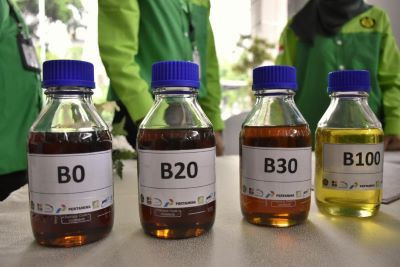Popular Reads
Top Results
Can't find what you're looking for?
View all search resultsPopular Reads
Top Results
Can't find what you're looking for?
View all search resultsBioenergy in Indonesia: Locally owned, locally sourced and locally managed
Heavy reliance on a limited range of feedstocks, such as the overreliance on palm oil, hampers energy independence and fails to tap into the potential of diversified locally available resources.
Change text size
Gift Premium Articles
to Anyone
Bioenergy has emerged as a promising solution for Indonesia's energy and environmental challenges. However, the current state of bioenergy in the country necessitates a paradigm shift to ensure its long-term sustainability.
The key to unlocking the full potential of bioenergy lies in embracing small-scale, locally-owned initiatives. By prioritizing local sourcing and management, Indonesia can foster economic growth, job creation and environmental sustainability.
This article delves into the trends of bioenergy and advocates for a transformative approach that will shape the future of this sector in Indonesia.
The current state of bioenergy in Indonesia primarily focuses on large-scale operations, often at the expense of local communities and the environment. Many bioenergy projects prioritize maximum output and efficiency, resulting in the utilization of extensive land areas. Unfortunately, this approach frequently leads to conflicts with local communities, deforestation and the loss of biodiversity.
Additionally, the heavy reliance on a limited range of feedstocks, such as the overreliance on palm oil, hampers energy independence and fails to tap into the potential of diversified locally available resources. Such unsustainable practices perpetuate a system that prioritizes foreign interests over local development, hindering the true potential of bioenergy in Indonesia.
Furthermore, large-scale bioenergy projects face significant challenges concerning land acquisition, environmental impact and community engagement. The acquisition of vast tracts of land for bioenergy plantations often entails the forced displacement of local communities and disrupts their traditional livelihoods.
The conversion of natural ecosystems for bioenergy production contributes to deforestation and exacerbates climate change, undermining the country's conservation efforts. Moreover, the lack of meaningful community engagement in decision-making processes creates social unrest and jeopardizes the long-term sustainability of bioenergy projects.
The current state of bioenergy in Indonesia is unsustainable and necessitates a reevaluation of its approaches and practices.
To ensure the long-term sustainability of bioenergy in Indonesia, a paradigm shift is vital. Bioenergy should be locally owned, locally sourced and locally managed. This transformative approach offers numerous benefits. One notable advantage is the empowerment of local communities.
For instance, the utilization of palm oil waste including used cooking oil as a feedstock for biodiesel production in rural areas including for fisherfolks demonstrates how local communities can generate clean energy, mitigate waste pollution and create job opportunities. This approach not only addresses environmental concerns but also fosters economic resilience and social cohesion.
There are compelling best practices in Indonesia and other countries that highlight the benefits of local ownership and management of bioenergy projects. In Indonesia, community-based renewable energy initiatives, such as micro-hydro and solar power projects, have yielded promising results.
These projects actively engage local communities in decision-making processes, allowing them to invest in and own renewable energy infrastructure. Likewise, countries like Germany and Denmark have successfully embraced community-owned renewable energy projects as part of their energy transition strategies. These initiatives empower citizens to participate in the shift toward renewable energy, bolster public support, promote local economic development and instill a sense of ownership.
Moreover, embracing a locally owned, locally sourced and locally managed bioenergy model in Indonesia can stimulate economic growth and job creation. By prioritizing small-scale bioenergy projects, the country can harness the potential of local farmers and communities. They can actively participate in bioenergy production using locally available feedstocks, thus creating employment opportunities and income streams.
This decentralized approach reduces dependence on imported feedstocks, strengthens energy self-sufficiency and revitalizes local economies.
In Indonesia, specific incentives are necessary to shift the paradigm of bioenergy practices toward locally owned, locally managed and locally sourced approaches. The current regulatory framework lacks the necessary mechanisms to encourage the development of diverse biofuel feedstocks.
While existing regulations address biofuel blends, they primarily focus on emerging industries and overlook the importance of supporting emerging feedstocks. To address this gap, the government should introduce targeted financial incentives, such as grants and subsidies, to stimulate investment in research, development and production infrastructure for alternative feedstocks.
Furthermore, supportive policies and regulatory frameworks are essential to create an enabling environment for biofuel diversification. Clear targets for the utilization of different feedstocks, along with quality standards and streamlined permitting processes, should be established. Simplifying bureaucratic procedures and reducing barriers to entry will encourage local entrepreneurs and communities to participate in biofuel production, fostering ownership and economic empowerment.
Alongside these measures, capacity building programs and knowledge sharing initiatives should be implemented to equip local stakeholders with the necessary skills and knowledge. Training programs on sustainable farming practices, technology transfer and best practices in biofuel production will enable active engagement in the bioenergy sector and ensure the sustainable utilization of locally sourced feedstocks.
By prioritizing the development of supportive mechanisms, including financial incentives, policies and capacity building programs, Indonesia can unlock the full potential of bioenergy. This approach will promote biofuel diversification, empower local stakeholders and drive sustainable energy practices.
To conclude, the future of bioenergy in Indonesia lies in a paradigm shift toward small-scale, locally-owned initiatives that prioritize local sourcing and management. By adopting this transformative approach, Indonesia can unlock economic growth, create jobs and safeguard the environment.
It is time to prioritize sustainability, empower local communities and shape a future where bioenergy serves as a catalyst for inclusive and resilient development.
***
The writer is a bioenergy program assistant at the Madani Berkelanjutan foundation. The views expressed are his own.










